外研版七年级上英语语法和练习复习解析
外研社七年级上册M1-2知识点语法复习练习
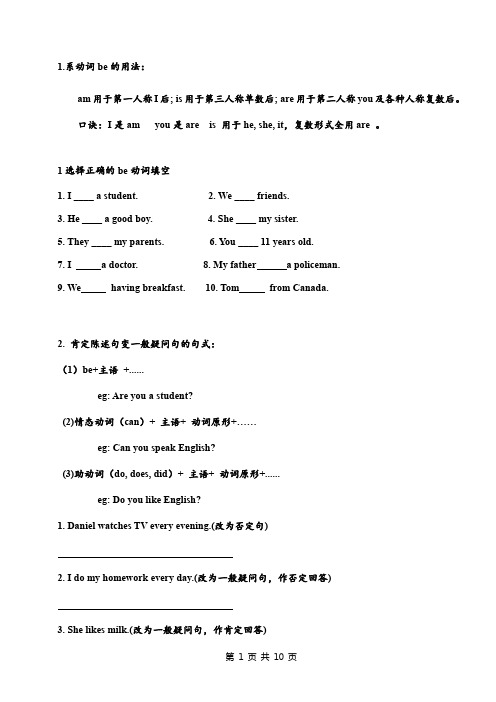
1.系动词be的用法:am用于第一人称I后; is用于第三人称单数后; are用于第二人称you及各种人称复数后。
口诀:I是am you是are is 用于he, she, it,复数形式全用are 。
1选择正确的be动词填空1. I ____ a student.2. We ____ friends.3. He ____ a good boy.4. She ____ my sister.5. They ____ my parents.6. You ____ 11 years old.7. I a doctor. 8. My father a policeman.9. We having breakfast. 10. Tom from Canada.2. 肯定陈述句变一般疑问句的句式:(1)be+主语+......eg: Are you a student?(2)情态动词(can)+ 主语+ 动词原形+……eg: Can you speak English?(3)助动词(do, does, did)+ 主语+ 动词原形+......eg: Do you like English?1. Daniel watches TV every evening.(改为否定句)2. I do my homework every day.(改为一般疑问句,作否定回答)3. She likes milk.(改为一般疑问句,作肯定回答)4. Amy likes playing computer games.(改为一般疑问句,作否定回答)5. We go to school every morning.(改为否定句)6. He speaks English very well.(改为否定句)7. She is always a good student.(改为一般疑问句,作否定回答)8. Simon and Daniel like going skating.(改为否定句)3. 代词(1)人称代词:主格:I we you you he she it they ( 做主语)宾格:me us you you him her it them ( 作宾语/表语)(2)物主代词:形容词性物主代词:my our your your his her its their (做定语)名词性物主代词:mine ours yours yours his hers its theirs (作定语以外成分) 名词性物主代词=形容词性物主代词+名词eg: mine = my book 我的书人称代词和物主代词练习A.从括号内选择正确的代词填空1. Your football clothes are on the desk.Please put _________(they,them,their,theirs) away.2. (We,Us,Our,Ours)_________ English teacher is Mrs. Green.We all like _________(she,her,hers).3. (I,Me,My,Mine)_________ can't get my kite.Could you help _________(I,me,my,mine)?4. Tom can't get down from the tree.Can you help _________(he,him,his)?5. Her kite is broken. Can _________(you,your,yours) mend(修理)it?6. We can't find our bikes.Can you help _________(we,us,our,ours)?7. These are _________(he,him,his) planes.The white ones are _________(I,me,mine).B.填入正确的人称代词和物主代词1. This isn't her knife. _________ is green.2. These are your books,Kate. Put __________ in the desk,please.3. You must look after ________ things.4. Wei Fang,is that ________ ruler? Yes,it's.5. They want a football. Give __________ the green one,please.1.指示代词(1) this / these 意为“这个;这些”,表示在时间或空间上离说话人较近的人或物。
外研版七年级上英语重点语法总结与练习
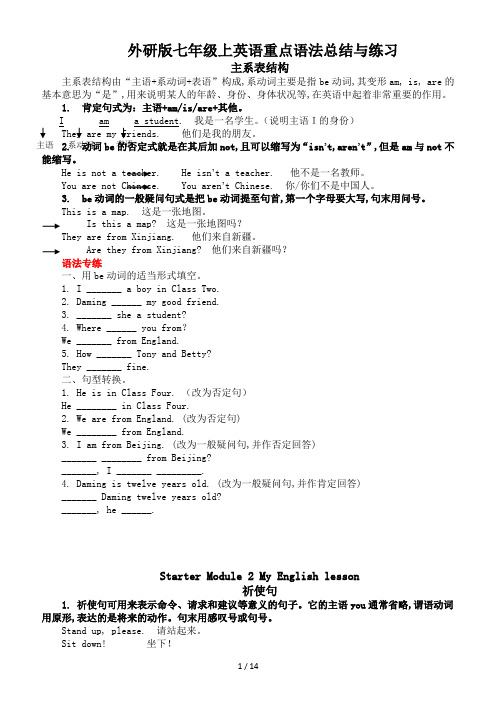
外研版七年级上英语重点语法总结与练习主系表结构主系表结构由“主语+系动词+表语”构成,系动词主要是指be动词,其变形am, is, are的基本意思为“是”,用来说明某人的年龄、身份、身体状况等,在英语中起着非常重要的作用。
1. 肯定句式为:主语+am/is/are+其他。
I am a student. 我是一名学生。
(说明主语I的身份)They are my friends. 他们是我的朋友。
主语系动词表语2. 动词be的否定式就是在其后加not,且可以缩写为“isn’t,aren’t”,但是am与not不能缩写。
He is not a teacher. He isn’t a teacher. 他不是一名教师。
You are not Chinese. You aren’t Chinese. 你/你们不是中国人。
3. be动词的一般疑问句式是把be动词提至句首,第一个字母要大写,句末用问号。
This is a map. 这是一张地图。
Is this a map? 这是一张地图吗?They are from Xinjiang. 他们来自新疆。
Are they from Xinjiang? 他们来自新疆吗?语法专练一、用be动词的适当形式填空。
1. I _______ a boy in Class Two.2. Daming ______ my good friend.3. _______ she a student?4. Where ______ you from?We _______ from England.5. How _______ Tony and Betty?They _______ fine.二、句型转换。
1. He is in Class Four. (改为否定句)He ________ in Class Four.2. We are from England. (改为否定句)We ________ from England.3. I am from Beijing. (改为一般疑问句,并作否定回答)_______ ________ from Beijing?_______, I _______ _________.4. Daming is twelve years old. (改为一般疑问句,并作肯定回答)_______ Daming twelve years old?_______, he ______.Starter Module 2 My English lesson祈使句1. 祈使句可用来表示命令、请求和建议等意义的句子。
外研版七年级上英语语法和练习复习

一、代词
1、人称代词和物主代词
第一人称
第二人称
第三人称
单数 复数 单数 复数
单数
复数
人 称 代
主 格
I
we you you she\ he\ it they
词宾 格
me
us
you you her\ him\ it
them
形
物 物 my our your your her \his\ its their
一、写出下列名词的复数形式
am__a__re_____ is_a__r_e_____ she _t_h_e_y___ it _t_h_e_y____
hthea_t__t__ht__he__oy__s__e_____
this___th__e_s_e__ you_y_o__u_____ pen__p_e_n__s___ desk___d__e_s_k_s_ key__k_e_y__s___ orange_o__r_a_n_g_es boy__b__o_y_s___ friend_f_r_ie__n_d_s__ parent_p_a_r_e_n_t_s__ motherm__o__th_e__rs brother_b_r_o_t_h_e_rsson__s_o_n_s___
• 3、She is her cousin . ___ ___ ____ __her ______
.用所给的词选择填空
1、These are pens and t_h_o_s_e are pencils.
(that, this, those)
2、Tom was sick yesterdayT. _h_a_t is why he
外研版七年级上英语重点语法总结与练习
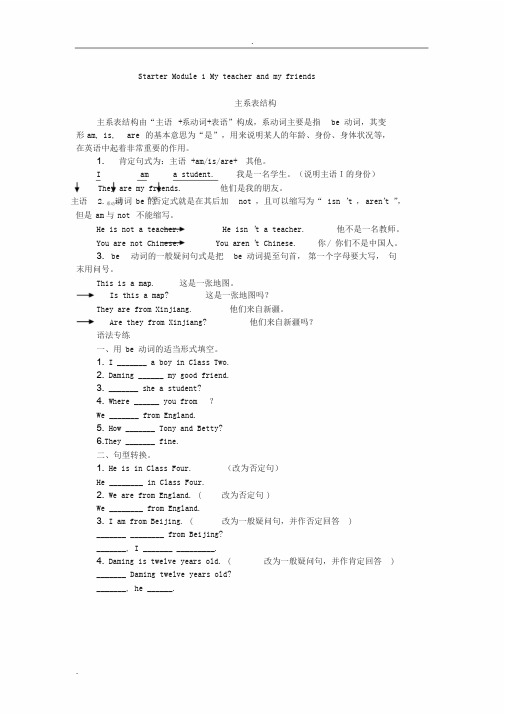
Starter Module 1 My teacher and my friends主系表结构主系表结构由“主语+系动词+表语”构成,系动词主要是指be 动词,其变形am, is, are 的基本意思为“是”,用来说明某人的年龄、身份、身体状况等,在英语中起着非常重要的作用。
1.肯定句式为:主语 +am/is/are+ 其他。
I am a student. 我是一名学生。
(说明主语I的身份)They are my friends. 他们是我的朋友。
主语 2.系动动词词 be表的语否定式就是在其后加not ,且可以缩写为“ isn ’t ,aren’t ”,但是am与not 不能缩写。
He is not a teacher. He isn ’t a teacher. 他不是一名教师。
You are not Chinese. You aren ’t Chinese. 你/ 你们不是中国人。
3.be 动词的一般疑问句式是把be 动词提至句首,第一个字母要大写,句末用问号。
This is a map. 这是一张地图。
Is this a map? 这是一张地图吗?They are from Xinjiang. 他们来自新疆。
Are they from Xinjiang? 他们来自新疆吗?语法专练一、用 be 动词的适当形式填空。
1. I _______ a boy in Class Two.2. Daming ______ my good friend.3. _______ she a student?4. Where ______ you from ?We _______ from England.5. How _______ Tony and Betty?6.They _______ fine.二、句型转换。
1. He is in Class Four. (改为否定句)He ________ in Class Four.2. We are from England. ( 改为否定句)We ________ from England.3. I am from Beijing. ( 改为一般疑问句,并作否定回答)_______ ________ from Beijing?_______, I _______ _________.4. Daming is twelve years old. ( 改为一般疑问句,并作肯定回答)_______ Daming twelve years old?_______, he ______.Starter Module 2 My English lesson祈使句2.祈使句可用来表示命令、请求和建议等意义的句子。
初中英语新外研版七年级上册Starter语法详细解析(名词+冠词)

七年级英语上册Starter语法解析一、名词解析*定义: 名词的数指数量,即“多少”。
单数:表示“一”;复数:表示“多于一”*名词可数性: 可数名词和不可数名词*可数名词单数变复数规则1.一般情况直接加s 如:star -- stars; book -- books 等2.以字母s, x, sh, ch等结尾词直接加es 如:bus --buses; watch -- watches等3.以字母f或fe结尾的词将f或fe变为v再加 es 如: leaf--leaves; knife -- knives等4.以辅音字母加y结尾的词变y为i再加es如: baby -- babies; city -- cities等5.以元音字母加y结尾的词直接加s 如:toy-- toys; monkey -- monkeys等6.以es, se, ze, ge等结尾的词直接加s 如:face -- faces; orange--oranges等7.以辅音字母加o结尾的词若表示有生命力则加es如:tomato--tomatoes; hero --heroes等若表示无生命力则加s 如:photo --photos 等8.不规则变化改a为e型: man--men; woman -- women改oo为ee型: tooth--teeth; foot --feet在词尾加-ren: child -- children单复数形式相同: sheep; deer; Chinese; Japanese常用复数形式或只有复数形式: noodles; glasses; trousers; thanks; clothes; chopsticks; people等其他特殊形式: mouse --mice老鼠; mouse -- mouses 鼠标注意: 1.有些以f或ef结尾的词直接加s变成复数:如:roof--roofs; chief--chiefs等2.由man和woman 构成的合成词,其复数形式需前后都变复数:如:man doctor -- men doctors; woman teacher -- women teachers等3.名词作定语修饰另一个名词时,通常只变后一个名词:如: boy student ---boy students; apple tree -- apple trees等*不可数名词的量化:通常不可数名词没有复数形式,不能用a/an修饰,且不能用数词直接修饰。
新版外研版七年级(上册)英语知识点解析

新版外研版七年级(上册)英语知识点解析本文是对新版外研版七年级(上册)英语课程内容进行的知识点解析,旨在帮助学生更好地掌握英语知识。
语法知识点1. 祈使句祈使句是表达命令、请求、劝告等意义的句子,通常用动词原形作谓语。
例如:- Sit down.- Don't be late.- Study hard.2. 一般现在时一般现在时表示现在经常、惯性的动作或者真理等。
一般现在时的肯定句结构为:主语 + 动词原形(第三人称单数要加-s)。
例如:- She often takes a bus to school.词汇知识点1. 数词数词用来表示数字、数量的词汇。
例如:- one, two, three, four- first, second, third, fourth2. 物品名称研究物品的名称可以帮助我们更好地了解和描述身边的事物。
例如:- pencil, eraser, ruler, book- desk, chair, blackboard, whiteboard交际知识点1. 问路当需要问路时,我们可以使用以下语句:- Excuse me, where is the nearest post office?- Can you tell me how to get to the library?2. 自我介绍自我介绍时,我们可以使用以下语句:- Hello/Hi, my name is ___. I am ___ years old.本文总结了新版外研版七年级(上册)英语课程中的相关语法、词汇、交际知识点,帮助学生更好地掌握英语知识,提高英语水平。
2024外研版英语七年级上册
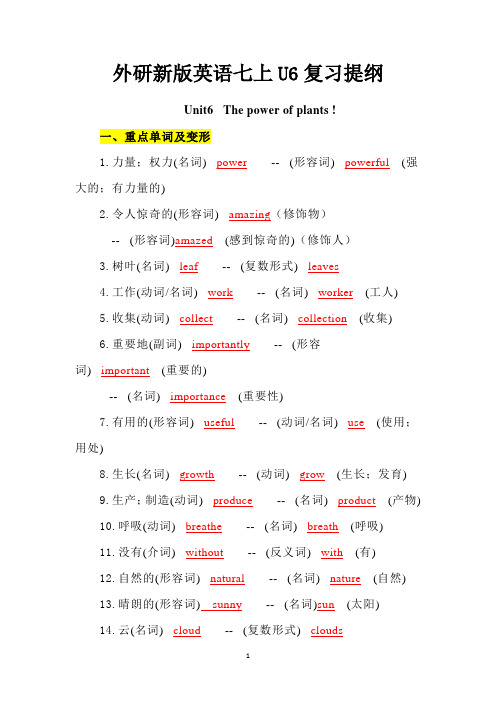
外研新版英语七上U6复习提纲Unit6 The power of plants !一、重点单词及变形1.力量;权力(名词) power-- (形容词) powerful(强大的;有力量的)2.令人惊奇的(形容词) amazing(修饰物)-- (形容词)amazed(感到惊奇的)(修饰人)3.树叶(名词) leaf-- (复数形式) leaves4.工作(动词/名词) work-- (名词) worker(工人)5.收集(动词) collect-- (名词) collection(收集)6.重要地(副词) importantly-- (形容词) important(重要的)-- (名词) importance(重要性)7.有用的(形容词) useful-- (动词/名词) use(使用;用处)8.生长(名词) growth-- (动词) grow(生长;发育)9.生产;制造(动词) produce-- (名词) product(产物)10.呼吸(动词) breathe-- (名词) breath(呼吸)11.没有(介词) without-- (反义词) with(有)12.自然的(形容词) natural-- (名词) nature(自然)13.晴朗的(形容词)sunny-- (名词)sun(太阳)14.云(名词) cloud-- (复数形式) clouds-- (形容词) cloudy(多云的)15.面条(名词) noodle-- (复数形式) noodles16.大的(形容词) big-- (比较级) bigger(更大的)-- (最高级) biggest(最大的)17.餐;盘子;菜肴(名词) dish-- (复数形式) dishes18.健康(名词) health-- (形容词) healthy(健康的) -- (副词) healthily(健康地)19.文化(名词) culture-- (复数形式) cultures20.喝(动词);饮品(名词) drink -- (过去式) drank21.制作(动词) make-- (过去式) made二、重点短语1.植物的力量the power of plants2.神奇的植物世界the amazing world of plants3.植物内部within a plant4.二氧化碳carbon dioxide5.七点半quarter past seven6.穿着他的绿色制服in his green uniform7.搜集阳光和二氧化碳collect sunlight and CO28.在白天during the day9.上升到... rise up to ...10.通过茎through the Stem11.最重要的是most importantly12.对...有用be useful for ...13.植物的生长the growth of the plant14.另一个产物another product15.对...来说很重要mean a lot to ...16.努力工作work hard17.变黑get dark18.休息一下take a rest19.数百万的... millions of ...20.地球上on earth21.超过;多余more than22.没有植物without plants23.自然世界the natural world24.如何产糖how to make sugar25.用其他的方法in other ways26.转变成... turn into ...27.太阳花的种子sunflower seed28.长成... grow into ...29.植物的不同部分different parts of plants30.变成... change into ...31.不同的颜色different colours32.在秋天in autumn33.欢迎来到welcome to ...34.穿过森林walk through the forest35.带雨衣take a raincoat36.某人自己的... one’s own ...37.抬头look up38.在...顶端at the top of ...39.形成云become clouds40.使...幸福make ... happy41.活数千年live for thousands of years42.住的地方somewhere to live43.吃的食物food to eat44.种树plant trees45.植树节Planting Day46.全世界around the world47.用不同的方法in different ways48.例如for example/ such as49.米粉rice noodles50.东亚the East Asia51....的重要性the importance of ...52....厘米长... centimetres long53.种玉米grow corn54....年以前... years ago55.玉米美食corn dishes56.玉米须corn silk57.玉米壳corn husks58.被用来做... be used to do sth.59.对...有好处be good for ...60.试着做某事try to do sth.61.寻求ask for ...62.当然of course63.共同点in common64.最受欢迎的饮品the most popular drink65.不但...而且... not only ... but also ...66....关键的一部分 a key part of ...67.像...一样多as many ... as ...68.一杯茶 a cup of tea69.过去常常做某事used to do sth.70.带某人去某地take sb. to地点71.喝茶drink tea72.出国留学study abroad73.大多数most of ...74.更喜欢做某事prefer to do sth.75.绿茶green tea76.红茶black tea77.感觉像feel like ...78.回家be back home79.下午茶afternoon tea80.整天all day81.放学后after school82.回来come back83.不是个秘密It’s no secret84.由...制成be made from ...(看不出原材料)85.由...制成be made of ... (看得出原材料)三、重点句型1.我们周围到处都有植物。
外研版英语七年级上学期语法专题复习现在进行时用法及练习(答案含解析)
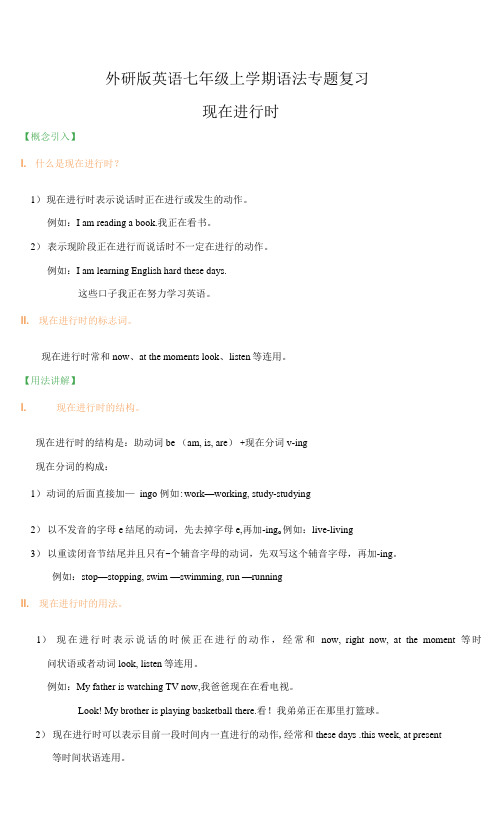
外研版英语七年级上学期语法专题复习现在进行时【概念引入】I. 什么是现在进行时?1)现在进行时表示说话时正在进行或发生的动作。
例如:I am reading a book.我正在看书。
2)表示现阶段正在进行而说话时不一定在进行的动作。
例如:I am learning English hard these days.这些口子我正在努力学习英语。
II. 现在进行时的标志词。
现在进行时常和now、at the moments look、listen等连用。
【用法讲解】I. 现在进行时的结构。
现在进行时的结构是:助动词be (am, is, are)+现在分词v-ing现在分词的构成:1)动词的后面直接加—ingo 例如:work—working, study-studying2)以不发音的字母e结尾的动词,先去掉字母e,再加-ing o例如:live-living3)以重读闭音节结尾并且只有-个辅音字母的动词,先双写这个辅音字母,再加-ing。
例如:stop—stopping, swim —swimming, run —runningII. 现在进行时的用法。
1)现在进行时表示说话的时候正在进行的动作,经常和now, right now, at the moment等时问状语或者动词look, listen等连用。
例如:My father is watching TV now,我爸爸现在在看电视。
Look! My brother is playing basketball there.看!我弟弟正在那里打篮球。
2)现在进行时可以表示目前一段时间内一直进行的动作,经常和these days .this week, at present 等时间状语连用。
例如:My parents are working on a farm these days.这些天我的父母在农场干活。
3)现在进行时还可以表示现在不断发展变化的小•情,表示不断发展变化的动词有get, grow,式。
外研版英语七年级上学期语法专题复习 一般现在时用法及练习(答案含解析)
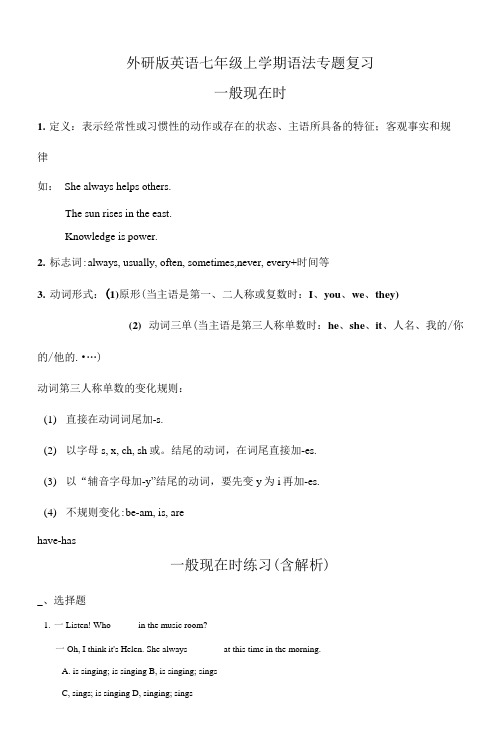
外研版英语七年级上学期语法专题复习一般现在时1.定义:表示经常性或习惯性的动作或存在的状态、主语所具备的特征;客观事实和规律如:She always helps others.The sun rises in the east.Knowledge is power.2.标志词:always, usually, often, sometimes,never, every+时间等3.动词形式:(1)原形(当主语是第一、二人称或复数时:I、you、we、they)(2)动词三单(当主语是第三人称单数时:he、she、it、人名、我的/你的/他的.•…)动词第三人称单数的变化规则:(1)直接在动词词尾加-s.(2)以字母s, x, ch, sh或。
结尾的动词,在词尾直接加-es.(3)以“辅音字母加-y”结尾的动词,要先变y为i再加-es.(4)不规则变化:be-am, is, arehave-has一般现在时练习(含解析)_、选择题1.一Listen! Who _____ in the music room?一Oh, I think it's Helen. She always ________ a t this time in the morning.A. is singing; is singing B, is singing; singsC, sings; is singing D, singing; sings2.— ____ the cat _______ l ovely?正在做某事情,时态上倾向于选择现在进行时态。
根据句意,你的弟弟每天都使用他的电脑吗?是的,他现在正在使用它。
【知识点】少数以。
结尾、肯定句、一般疑问句及其回答20.【答案】D【解析】考查动词。
句意:——大卫怎样去学校?——他经常骑自行车去学校。
他住得离学校有点远。
句子主语he是第三人称单数,因此谓语也要用第三人称单数形式,排除A、B o骑自行车要用动词ride。
初中英语新外研版七年级上册Unit 4语法讲解(2024秋)

七年级英语上册Unit 4语法讲解一、语法解析(一)频率副词1.频率副词用来表示某一动作发生的频率或某一状态出现的频率,常见的有(按程度由大到小排列)always(总是,一直);usually(通常);often(经常);sometimes(有时);seldom (很少);never(从不)。
2.对频率副词提问常用how often开头3.在句中位置(1)在连系动词be之后。
Eg: She is sometimes very busy.她有时非常忙。
(2)在助动词或情态动词之后。
Eg: I can always remember you.我会一直记得你。
(3)在行为动词之前。
Eg: We often go there. 我们经常去那。
(4)sometimes可放在句首、句中或句末。
Eg: Sometimes she writes to me. 有时她给我写信。
4.用法(1) often, always, usually等常和一般现在时连用,表示现在经常或反复发生的动作。
Eg: I always go to bed at ten o’clock. 我总是10点睡觉。
(2) always可与进行时连用,并不强调动作正在进行,表示赞叹、厌烦等情绪。
Eg: He is always thinking of others.他总是为其他人着想。
She is always asking silly questions.她总是问愚蠢的问题。
(二)一般现在时1.用法:(1)表示经常性或习惯性的动作或现在存在的状态(2)表示人的性格、能力、特征或爱好等。
(3)表示客观真理或普遍事实。
2.句式:(1)肯定句:主语 + 动词原形 + 其它Eg: I often go to school at 7:00. 我经常七点去上学。
(2)否定句:主语 + don’t + 动词原形 + 其它Eg: They don’t sing every morning. 它们每天早上不唱歌。
外研版英语七年级上学期语法专题复习 Be动词用法及练习(答案含解析)
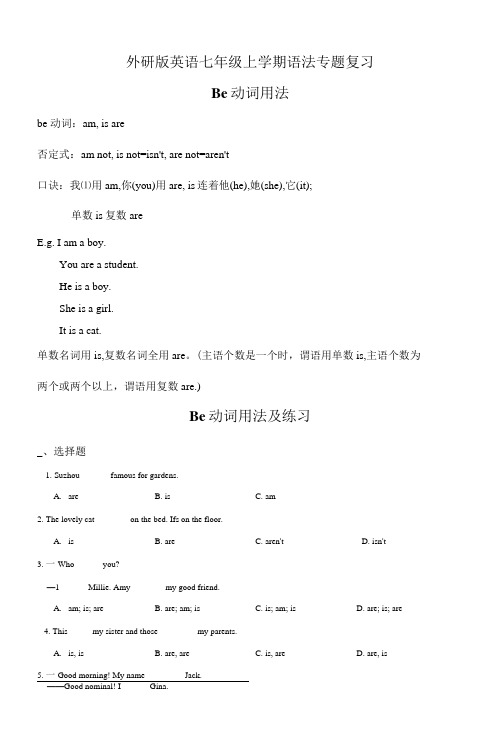
外研版英语七年级上学期语法专题复习Be动词用法be 动词:am, is are否定式:am not, is not=isn't, are not=aren't口诀:我⑴用am,你(you)用are, is连着他(he),她(she),它(it);单数is复数areE.g. I am a boy. _______________________You are a student. _________________________He is a boy. __________________She is a girl. _________________It is a cat. _________________________单数名词用is,复数名词全用are。
(主语个数是一个时,谓语用单数is,主语个数为两个或两个以上,谓语用复数are.)Be动词用法及练习_、选择题1. Suzhou _______ f amous for gardens.A.areB. isC. am2. The lovely cat _______ on the bed. Ifs on the floor.A.isB. areC. aren'tD. isn't3. 一Who ______ you?—1____ Millie. Amy _ ___ my good friend.A.am; is; areB. are; am; isC. is; am; isD. are; is; are4. This____ my sister and those ________ my parents.A.is, isB. are, areC. is, areD. are, is5. 一Good morning! My name ________ Jack.——Good nominal! I Gina.30.【答案】B【解析】句意:-- 你好吗?---- 我很好。
外研版七年级上英语重点语法总结与练习
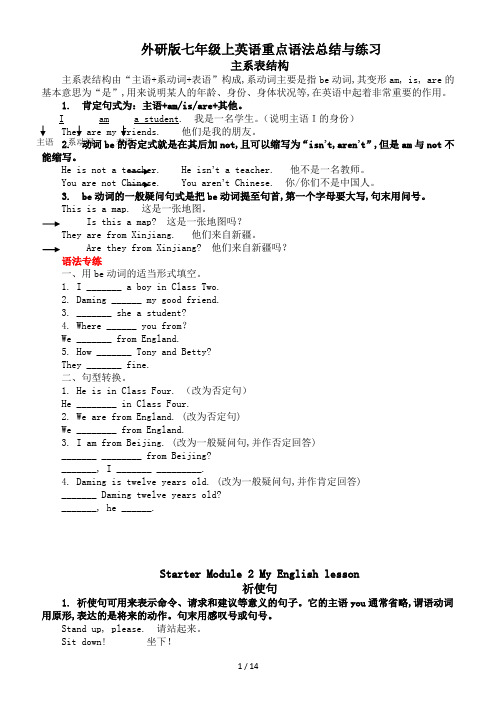
外研版七年级上英语重点语法总结与练习主系表结构主系表结构由“主语+系动词+表语”构成,系动词主要是指be动词,其变形am, is, are的基本意思为“是”,用来说明某人的年龄、身份、身体状况等,在英语中起着非常重要的作用。
1. 肯定句式为:主语+am/is/are+其他。
I am a student. 我是一名学生。
(说明主语I的身份)They are my friends. 他们是我的朋友。
主语系动词表语2. 动词be的否定式就是在其后加not,且可以缩写为“isn’t,aren’t”,但是am与not不能缩写。
He is not a teacher. He isn’t a teacher. 他不是一名教师。
You are not Chinese. You aren’t Chinese. 你/你们不是中国人。
3. be动词的一般疑问句式是把be动词提至句首,第一个字母要大写,句末用问号。
This is a map. 这是一张地图。
Is this a map? 这是一张地图吗?They are from Xinjiang. 他们来自新疆。
Are they from Xinjiang? 他们来自新疆吗?语法专练一、用be动词的适当形式填空。
1. I _______ a boy in Class Two.2. Daming ______ my good friend.3. _______ she a student?4. Where ______ you from?We _______ from England.5. How _______ Tony and Betty?They _______ fine.二、句型转换。
1. He is in Class Four. (改为否定句)He ________ in Class Four.2. We are from England. (改为否定句)We ________ from England.3. I am from Beijing. (改为一般疑问句,并作否定回答)_______ ________ from Beijing?_______, I _______ _________.4. Daming is twelve years old. (改为一般疑问句,并作肯定回答)_______ Daming twelve years old?_______, he ______.Starter Module 2 My English lesson祈使句1. 祈使句可用来表示命令、请求和建议等意义的句子。
外研社七年级(上)语法点讲解和练习

一、名词单复数可数名词的复数——1.一般情况下 + sbook-books; bird-birds2.以辅音字母+y 结尾, 变y 为 i ,再加esstory-stories; party-parties3.以s, sh, ch ,x 结尾的单词 + esbus-buses; dish-dishes; watch-watches; box-boxes4.以辅音字母+o 结尾的+espotato-potatoes; tomato-tomatoes; hero-heroes(photo-photos; piano-pianos )5.以f 或fe 结尾的把f 或fe 变为v ,再加esshelf-shelves; leaf-leaves;knife-knives; wife-wives; life-lives不规则名词的复数——man →men, woman →women, child →children, tooth →teeth, foot →feet,sheep →sheep, deer →deer, fish →fish二、some 和any 的用法Some 用于肯定句(在提出建议,请求的时候some ),any 用于否定句和疑问句。
1) Ann has________ candies.2) Bill doesn't have________ money.4) There is________ milk in the fridge.5) There isn't________ beer.6) There aren't________ boys in my family.7)Would you like ______ water to drink?1. house _________2. village ___________3. map __________4. bag ___________5. bus ___________6. city __________7. box ___________8. baby __________9. dictionary __________ 10. watch _________11. woman _________ 12. match __________ 13. man _________ 14. tooth __________ 15. wife ___________ 16. foot ___________ 17. knife __________ 18. sheep __________ 19. life ___________ 20. child __________三there be 和have 的区别"there be"与"have"译成汉语时都bai有一个"有"字,这二du者之间又有什么区别呢?且zhi 看下面的比较。
外研版七年级上英语重点语法总结与练习

Starter Module 1 My teacher and my friends主系表结构主系表结构由“主语+系动词+表语”构成,系动词主要是指be动词,其变形am, is, are的基本意思为“是”,用来说明某人的年龄、身份、身体状况等,在英语中起着非常重要的作用。
1.肯定句式为:主语+am/is/are+其他。
I am a student. 我是一名学生。
(说明主语I的身份)They are my friends.他们是我的朋友。
主语系动词表语2.动词be的否定式就是在其后加not,且可以缩写为“isn’t,aren’t”,但是am与not不能缩写。
He is not a teacher. He isn’t a teacher. 他不是一名教师。
You are not Chinese. You aren’t Chinese. 你/你们不是中国人。
3. be动词的一般疑问句式是把be动词提至句首,第一个字母要大写,句末用问号。
This is a map. 这是一张地图。
Is this a map? 这是一张地图吗?They are from Xinjiang. 他们来自新疆。
Are they from Xinjiang? 他们来自新疆吗?语法专练一、用be动词的适当形式填空。
1. I _______ a boy in Class Two.2. Daming ______ my good friend.3. _______ she a student?4. Where ______ you from?We _______ from England.5. How _______ Tony and Betty?They _______ fine.二、句型转换。
1. He is in Class Four. (改为否定句)He ________ in Class Four.2. We are from England. (改为否定句)We ________ from England.3. I am from Beijing. (改为一般疑问句,并作否定回答)_______ ________ from Beijing?_______, I _______ _________.4. Daming is twelve years old. (改为一般疑问句,并作肯定回答)_______ Daming twelve years old?_______, he ______.祈使句1. 祈使句可用来表示命令、请求和建议等意义的句子。
初中英语新外研版七年级上册Unit 1 A new start语法讲解(2024秋)
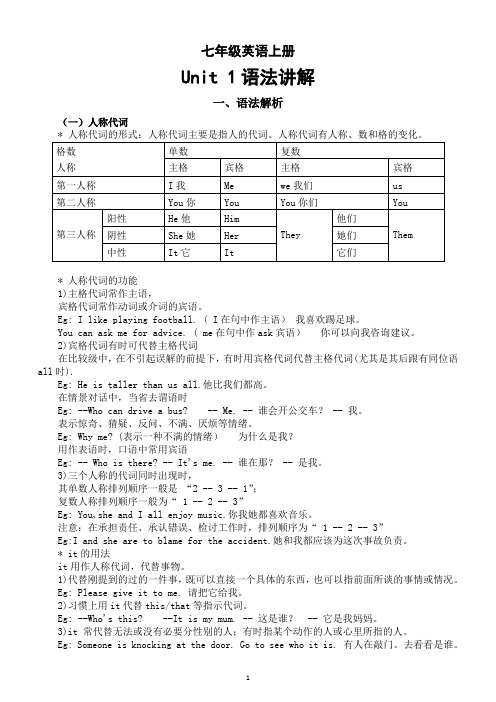
七年级英语上册Unit 1语法讲解一、语法解析(一)人称代词* 人称代词的功能1)主格代词常作主语,宾格代词常作动词或介词的宾语。
Eg: I like playing football. ( I在句中作主语)我喜欢踢足球。
You can ask me for advice. ( me在句中作ask宾语)你可以向我咨询建议。
2)宾格代词有时可代替主格代词在比较级中,在不引起误解的前提下,有时用宾格代词代替主格代词(尤其是其后跟有同位语all时).Eg: He is taller than us all.他比我们都高。
在情景对话中,当省去谓语时Eg: --Who can drive a bus? -- Me. -- 谁会开公交车? -- 我。
表示惊奇、猜疑、反问、不满、厌烦等情绪。
Eg: Why me? (表示一种不满的情绪)为什么是我?用作表语时,口语中常用宾语Eg: -- Who is there? -- It's me. -- 谁在那? -- 是我。
3)三个人称的代词同时出现时,其单数人称排列顺序一般是“2 -- 3 -- 1”;复数人称排列顺序一般为“ 1 -- 2 -- 3”Eg: You,she and I all enjoy music.你我她都喜欢音乐。
注意:在承担责任、承认错误、检讨工作时,排列顺序为“ 1 -- 2 -- 3”Eg:I and she are to blame for the accident.她和我都应该为这次事故负责。
* it的用法it用作人称代词,代替事物。
1)代替刚提到的过的一件事,既可以直接一个具体的东西,也可以指前面所谈的事情或情况。
Eg: Please give it to me. 请把它给我。
2)习惯上用it代替this/that等指示代词。
Eg: --Who's this? --It is my mum. -- 这是谁? -- 它是我妈妈。
初中英语新外研版七年级上册Unit 1 A new start重点语法代词知识讲解练习(2024秋)
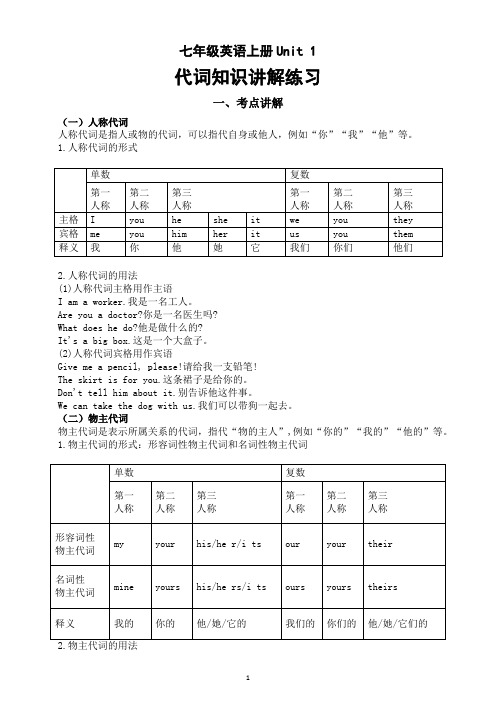
七年级英语上册Unit 1代词知识讲解练习一、考点讲解(一)人称代词人称代词是指人或物的代词,可以指代自身或他人,例如“你”“我”“他”等。
1.人称代词的形式2.人称代词的用法(1)人称代词主格用作主语I am a worker.我是一名工人。
Are you a doctor?你是一名医生吗?What does he do?他是做什么的?It's a big box.这是一个大盒子。
(2)人称代词宾格用作宾语Give me a pencil, please!请给我一支铅笔!The skirt is for you.这条裙子是给你的。
Don't tell him about it.别告诉他这件事。
We can take the dog with us.我们可以带狗一起去。
(二)物主代词物主代词是表示所属关系的代词,指代“物的主人”,例如“你的”“我的”“他的”等。
1.物主代词的形式:形容词性物主代词和名词性物主代词(1)形容词性物主代词起形容词的作用,在句中作定语修饰名词,不可单独使用It is my new bike.这是我的新自行车。
Miss Li is our English teacher.李老师是我们的英语老师。
(2)名词性物主代词起名词的作用,在句中可作主语、宾语、表语,可单独使用(名词性物主代词=形容词性物主代词+名词)My bag is black. Hers is blue.我的包是黑色的,她的是蓝色的。
(Hers = Her bag)I don't like my dress. I like yours.我不喜欢我的裙子,我喜欢你的。
(yours = your dress)The blue jacket is mine.这件蓝色夹克是我的。
(mine = my jacket)(三)反身代词反身代词是表示反射或者强调的代词,例如“我自己”“你自己”“他自己”等。
- 1、下载文档前请自行甄别文档内容的完整性,平台不提供额外的编辑、内容补充、找答案等附加服务。
- 2、"仅部分预览"的文档,不可在线预览部分如存在完整性等问题,可反馈申请退款(可完整预览的文档不适用该条件!)。
- 3、如文档侵犯您的权益,请联系客服反馈,我们会尽快为您处理(人工客服工作时间:9:00-18:30)。
• 二,用合适的代词填空
1._____I___(我) am a student. ___M__y____ (我的)name is Gina.
This is ____m__y__ (我的)sister.
This pencil is _m__i_n_e(我的). Where is __m__y___(我的)schoolbag? (我的)M___in__eis on the desk. (我的)___M__y______favorite subject is
science.
2、Do _y_o_u__(你)have a soccer ball?
Is this __y_o__u_r_(你的) pencil? Do _y_o_u__(你)like bananas?
When is _y_o__u_r(你的) birthday? What is __y_o_u_r_(你的)favorite subject?
Who is _h_is__(他的)music teacher. Why does ___h_e___(他)like P.E.?
When is __h_i_s___(他的) music class? This soccer ball is __h_is__(他的). Where is __h_i_s___(他的)schoolbag?
(他的)_H__is__ is on the desk.
4.
Is __s_h_e___(她)Helen?
What’sh_e_r____(她的)phone number? __H_e_r___(她的) father is a teacher. _S_h_e(她)often plays tennis after school. When is _h_e_r_(她的) birthday? What is _h__e_r_(她的)favorite subject? Who is h_e_r_(她的)music teacher. Why does ___s_h_e__(她)like P.E.? When is __h__e_r__(她的) music class? This ping-pong bat is _h_e_r_s_ (她的). Where is __h_e__r __(她的)schoolbag? (她的)_H__e_r_s is on the desk.
3.Is ___h_e___(他)Alan? What’s ___h_is___(他的) last name? What’s h_i_s_____(他的)phone number? __H_i_s___(他的) father is a teacher. _H_e_(他)often plays basketball. When is _h_i_s_(他的) birthday? What is _h_i_s_(他的)favorite subject?
Who is _y_o_u_r(你的)P.E. teacher. Why do __y_o_u___(你)like P.E.?
When is __y_o_u_r__ (你的) P.E. class?
Where is __y_o__u_r _(你的)schoolbag? (你的)_Y_o_u_r_s is on the desk.
主代代Biblioteka 词名 物 代mine
yours
hers \his\ its
ours
yours
theirs
人称代词和物主代词练习:(一)用代词的适当形式填空。
1.There is a letter for__h_e__r___ (her 、hers) mother. 2.That is _h_e_r__(she ) coat. The coat is red. _It__(it)is a new one. 3.Whose pens are these? _T__h_e_y__(their) are __o_u_r_s_ (we). 4.Give __h_im____(he) a toy, please. 56.._T_iOm__ua_nr_d_B_(ilwl aer)eetyweisnsa.re__bT_la_hc_ek_.i_r__(them) parents are teachers.
5.
__W__e___(我们) are late. Please let__u_s__(我们)play soccer. __O_u_r___(我们的) classroom is big.
___Y_o_u_r_s___( 你们的) is small. ___T_h_e_ir_s___(他们)are my parents.
外研版七年级英语(上册) 语法复习
一、代词
1、人称代词和物主代词
第一人称
第二人称
第三人称
单数 复数 单数 复数
单数
复数
人 称 代
主 格
I
we you you she\ he\ it they
词宾 格
me
us
you you her\ him\ it
them
形
物 物 my our your your her \his\ its their
7.Give the book to __m__e______(I ). 8.These books are ____o__u_r_s__(we). 9.That is not ___m__y____ kite. That kite is very small, but __m__i_n_e___ is very big.( I ) 10.The dress is ___h__e_r_s__. Give it to ___h_e__r___. ( she ) 11.Is this __y_o_u_r____ watch? (you) No, it’s not _m__i_n_e____ . ( I ) 12._H_e____ is my brother. _H__i_s_ name is Jack. Look! Those stamps are __h_i_s_. ( he )
